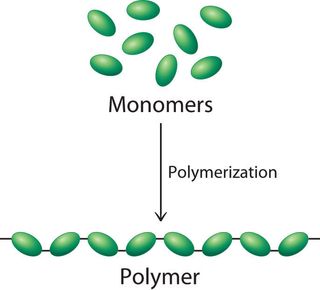Reusing Polymers: Promoting a Circular Economic Climate
Wiki Article
Checking Out the Varied Applications and Advantages of Polymers in Different Industries
Polymers, with their varied variety of residential properties and capabilities, have actually come to be essential in different markets, each enjoying distinct take advantage of their application. Polymers. From enhancing safety and performance in the automotive sector to revolutionizing medical tools in the medical care sector, polymers play an essential function. Furthermore, their environment-friendly nature is changing the landscape of sustainability methods. As we look into the midsts of polymers in electronics, we uncover cutting-edge technologies, while their architectural integrity changes the world of building and facilities. The pervasive impact of polymers throughout industries is a testimony to their adaptability and versatility, shaping the future of countless markets.Automotive Sector Applications
Polymers play a critical function in boosting the efficiency and resilience of different elements within the auto sector. One famous usage of polymers in the auto industry is in the production of lightweight elements.

Health Care Sector Benefits
In numerous medical care applications, the benefits of utilizing polymers are extensively identified for their varied variety of beneficial residential properties. Polymers play a crucial role in the healthcare industry due to their versatility, biocompatibility, and cost-effectiveness. Among the key benefits of polymers in healthcare is their ability to be customized to specific needs, such as versatility, resilience, and biodegradability, making them optimal for a variety of medical applications.Polymer-based products are thoroughly utilized in medical devices, such as catheters, implants, prosthetics, and medicine distribution systems, because of their biocompatibility and capability to imitate natural cells. These materials can decrease the risk of sensitive reactions or beings rejected, enhancing person safety and security and results. Furthermore, polymers are lightweight, making them ideal for wearable clinical devices and guaranteeing client comfort.
Furthermore, polymers allow the development of cutting-edge treatment approaches, such as hydrogels for tissue design and nanocomposites for targeted medicine shipment. Their convenience of processing and sanitation makes them essential for preserving high standards of hygiene in medical care settings. On the whole, the diverse benefits of polymers contribute substantially to advancements in medical technology and individual care.
Environmental Advantages of Polymers

Furthermore, polymers can add to energy cost savings because of their light-weight nature. In sectors such as transport, light-weight polymer products can help in reducing gas consumption and greenhouse gas emissions. Additionally, polymers can enable the advancement of energy-efficient products such as insulation materials that improve energy conservation in buildings.
Furthermore, polymers play a vital duty in lowering water air pollution. The usage of polymer-based purification systems can effectively remove contaminants and pollutants from wastewater, guarding water sources and environments. On the whole, the ecological advantages of polymers make them valuable possessions in advertising sustainability and environmentally friendly practices across various industries.
Polymers in Electronic Devices and Modern Technology
Taking into consideration the increasing demand for innovative and lasting remedies in modern-day markets, the assimilation of sophisticated polymer innovations in the realm of electronic devices and innovation has actually emerged as a crucial method for driving effectiveness and performance. Polymers have actually changed the electronics sector by making it possible for the production of lighter, much more flexible, and durable electronic tools. From mobile phones to medical tools, polymers play an essential role in boosting item design and functionality.One substantial benefit of polymers in electronic devices is their protecting residential or commercial properties, which help secure fragile electronic elements from environmental variables and electric disturbance. Additionally, polymers are crucial in the development of versatile display screens, wearable technology, and published electronic devices, offering unlimited opportunities for creating smart and interconnected gadgets.
Moreover, making use of polymers in digital product packaging has resulted in improvements in miniaturization and thermal monitoring, boosting the general performance and integrity of electronic systems. As innovation remains to advance, the versatility and adaptability of polymers will most certainly drive further development in the electronic sites devices market, forming the future of modern technology.
Duty of Polymers in Building And Construction and Infrastructure
The combination of sophisticated polymer products in building and facilities jobs has reinvented the method frameworks are created and constructed in modern-day times. Polymers use many benefits in the building market because of their adaptability, toughness, and cost-effectiveness. One vital duty of polymers in building is their use in finishings and sealants, offering protection versus ecological variables such as dampness, UV radiation, and corrosion. Furthermore, polymers are utilized in the manufacturing of lightweight and high-strength composite materials, boosting the architectural honesty of structures while decreasing general weight.Furthermore, Resources polymers play an important role in sustainable building and construction techniques by making it possible for the advancement of energy-efficient structures. Shielding products made from polymers assist regulate indoor temperature levels, decreasing the need for home heating and cooling systems and inevitably reducing energy intake. The use of polymer-based compounds in infrastructure jobs such as bridges and roadways enhances their durability and lowers maintenance expenses. Overall, the consolidation of polymers in building and construction and infrastructure showcases their substantial influence on contemporary design methods.
Conclusion
To conclude, polymers play a critical duty in various industries such as automotive, health care, environmental, electronic devices, and building. Their functional residential or commercial properties make them useful in producing ingenious remedies and products. From improving fuel efficiency in vehicles to improving medical gadgets, polymers use many benefits. Furthermore, their influence on lowering waste and advertising sustainability highlights see this here their relevance in modern applications. The prevalent use polymers shows their substantial payment to advancing technology and improving lifestyle.Report this wiki page